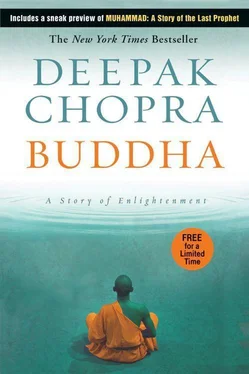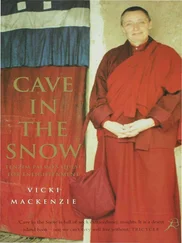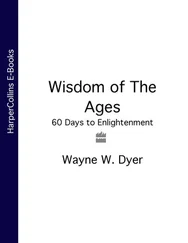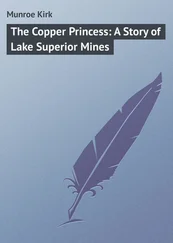As his face turned up to the sky, which was still divided between sun and clouds, his arms felt Devadatta’s body grow more and more still.
Surrender, and be free.
For the first time since he could remember, a voice came to him from another place. Siddhartha’s grip weakened just a fraction.
Surrender, and be free.
When the voice came back again, Siddhartha could hardly keep from shouting back, Haven’t I already surrendered? He had conceded the fight to his enemy, yet instead of freeing him, it had opened him to treachery. What was this new surrender? Where would it take him? Siddhartha felt seized with fear. If he let go of Devadatta, their old enmity would be twice as strong; he would have failed his father and turned victory into humiliation. None of that mattered now. Deep down he knew what he had to surrender. The voice wanted him to jump into the abyss, a place deep inside and completely unknown to him. It was the only way out.
Devadatta quivered and softly moaned. Siddhartha dropped him without being aware of his action. He walked to the edge of a cliff-the image in his mind was as real to him as anything he’d ever seen-and leaped. He saw his arms fly up and the yawning gulf, like a monstrous mouth, below him. His first impulse was to shriek, so dizzying was the sensation of plummeting into emptiness. This must be like dying, he thought. He couldn’t feel his body anymore; no sights or sounds reached him from the outside world. But his worst fears were unfounded. The void was not a place of destruction and chaos. No, it was very different.
He saw his mother holding a baby in her arms, and her face was the sun. He saw Mara sitting on his throne surrounded by swarming, buzzing entities, and his face was the night. He saw his father, an infant swaddled in a suit of armor, crying to be let out because he was suffocating. He saw Sujata, the stars, Channa riding the white stallion Kanthaka. The spectacle whirled and slipped past him like painted gossamer, and Siddhartha laughed, feeling exhilarated. The things that had meant so much were as thin and fragile as tissue.
He kept on falling. The tissuelike images flew apart. It was like watching the wind scatter leaves, and the leaves were his life. As this life evaporated before his eyes, Siddhartha felt a shiver, as if someone had ripped off his winter coat and left him naked in the cold. But he wasn’t naked, and far from dead. Instead of the mask of images and memories, surrounding him on every side was something pure and free: life itself. He couldn’t remember who he was. There was nothing left of his fears and dreams, nothing to do, nothing to want. He was simply alive, the breath of the breath, the eye of the eye.
The falling sensation ended. Siddhartha was held in suspension, an invisible spider dangling from an invisible thread. It would have been wonderful to remain like that. It would have been everything. Then a low throbbing could be heard like distant thunder, and it rolled toward him, a wave of thunder that boomed in the night until the muffled boom turned into a word.
“Son?”
Siddhartha opened his eyes. His father’s stricken face covered the sky. I’m all right, he wanted to say, seeing the sick worry in the king’s eyes. No words came out. They were stifled by Siddhartha’s emotions. He reached back in his mind, trying to return to where he’d been after he leaped into the abyss. There was nothing there.
He felt his father lifting his head; other arms were under his legs and torso. They lowered him onto a litter, and then he was jounced up and down as the bearers ran with him toward the palace. He was returning to his right mind now, full of images and memories once again. What had he done to Devadatta? What would happen to Channa? His whole body felt heavier; it was being tied to earth again by a thousand threads. Siddhartha struggled, desperate to break free. Then a physician’s soothing voice said, “Try to calm down. Quit fighting.” Someone pressed a cold slimy thing to his forehead, and the last thing Siddhartha saw before passing out was the painted ceiling of his father’s bedroom, in the image of the sky.
“HEAT STROKE, THAT’S ALL. Did you see his face? He was sweating like mad, then he turned white as a sheet before they carried him off. He could have died.”
“He went crazy. It was bound to happen. Don’t you know the pressure he’s under? You’d crack too.”
“The wretched boy’s cursed. My wife has a maid who can see demons. The one she saw around him almost scared her to death.”
The rumor mill at court hummed with excited speculation. No one could make their favorite theories stick. They were too bewildered over Siddhartha’s sudden outbreak of violence. Would he ever be himself again? The gods of gossip were not sure. After three days the leeching was over, and the royal physicians, squeezing clotted blood between their fingers, declared that the worst poisons had been extracted. The astrologers sounded guardedly optimistic about the transit of Mercury coming to an end after it had combusted with the sun. In their eyes, malefic forces had taken over Siddhartha. Suddhodana didn’t believe any of it. But no one had died, and if his guests went away thinking he had raised a half-demented son, it was better than thinking he had raised a gentle one.
Even though Devadatta’s dagger had drawn considerable blood, and losing more was dangerous, Siddhartha felt no distress over the leeching-not compared to the shroud of sadness that would not unwind from his heart. His father refused to leave him unattended, but late at night when the nurse’s head lolled on her breast-Siddhartha made sure she was given a double cup of liquor with supper-he crept out of bed and paced the floor. In his mind he would approach the edge of an abyss again, but when he jumped, nothing happened. It was simply his imagination.
Siddhartha got reluctant permission to have Channa admitted to his room. He breathed a sigh when he set eyes on him. He was still alive. Siddhartha’s relief was too enormous to disguise. Channa was embarrassed; he raised his voice and talked about the whole affair with bravado. “No one’s going to kill me. I have friends everywhere. I’m protected.” But Siddhartha noticed welts on Channa’s shoulders, and when he pressed him for an explanation, the truth emerged.
There was consternation on the field of combat when Siddhartha and Devadatta had both been carried away. The king ordered the massed fighters to remain in place, which added an air of threat to the confusion, but he wanted to make sure that every guest realized that his army was always at the ready. No one had time for Channa, who ran back to the stables and packed his best saddle horse to leave. As he was stuffing food and blankets into leather bags, he sensed that someone had entered the stall.
“Father?” He turned around expecting to confront Bikram, who would never forgive him for touching a high-caste. But it was the king, who had not forgotten Channa for a moment. He brandished a whip in his hands.
“I expect you to take what’s coming to you and then keep your mouth shut.”
Without waiting for a reaction, Suddhodana struck the youth across the chest with the lash’s iron-tipped barbs-there were three, a gentler version of the deadly seven-tipped whip used in battle. The pain was excruciating; Channa fell to the ground and rolled over, which was fortunate, because the king was in a genuine rage and vented it by striking him, over and over, across the back and shoulders instead of his face.
The only way that Channa could keep from passing out was to force himself not to count the blows. This one’s the last, he thought every time the iron hooks raked his flesh. It never was the last, however, or so it seemed. Then he became aware that the searing pain was coming not from the lash anymore but from the wounds he already had. Channa risked looking up, and he saw the king stooped over, panting hard with the whip dropped to the stable floor.
Читать дальше












